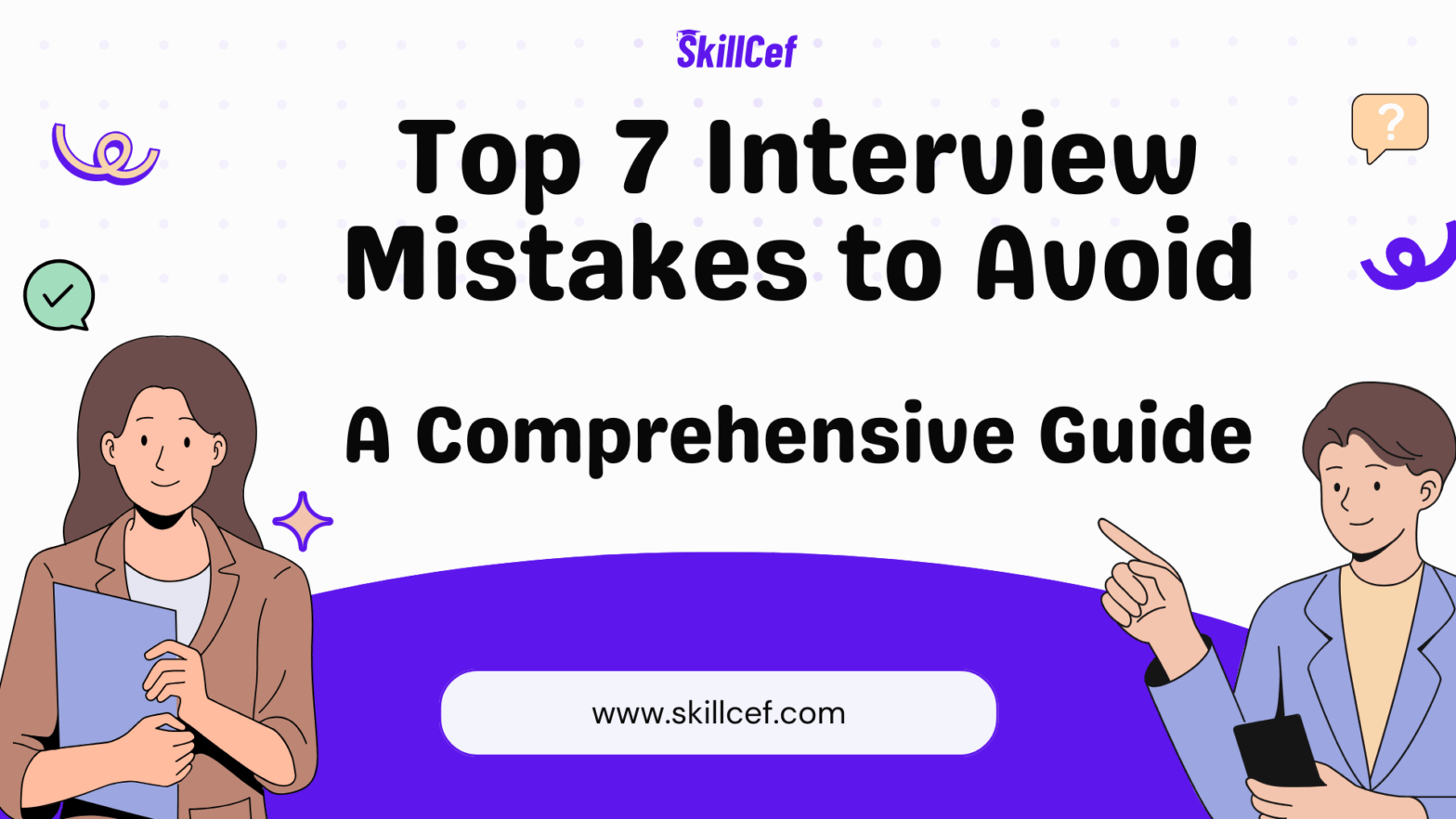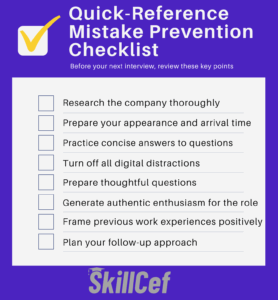
Top 7 Interview Mistakes to Avoid: A Comprehensive Guide
A recent survey by JobVite found that 93% of employers consider the interview the most important part of the hiring process. Yet many candidates focus almost all their preparation time on their resume and very little on interview skills.
You’ve sent your resume, got the call, and scheduled the interview. Great! The hard part is over, right? Not quite. Many qualified candidates miss out on perfect job opportunities because of mistakes they make during interviews.
This guide will help you spot and fix the most common interview blunders before they cost you your dream job. For each mistake, I’ll explain. Why does it hurt your chances? How to fix it. Real examples from hiring managers.
Mistake #1. Walking in Unprepared
The research gap problem. Many candidates think a quick glance at the company website is enough. It’s not. Sara, a hiring manager at a tech firm, told me, “I asked a candidate what she thought about our new product launch. She stared blankly and admitted she didn’t know we had launched anything. That interview was effectively over at that point.”
Neglecting to thoroughly research a prospective employer sends a potent negative message, signaling a lack of genuine interest in the specific opportunity and a potential deficiency in proactive initiative—qualities crucial for making informed decisions if hired.
Conversely, a commitment to comprehensive research, moving beyond basic website reviews to encompass industry context, competitor analysis, and even experiential engagement with their offerings, demonstrates a profound level of engagement and a strategic mindset.
Success in this area is marked by the ability to articulate a nuanced understanding of the company’s unique position, current challenges, and how your specific skills directly address their needs, culminating in a tangible “cheat sheet” that solidifies your preparedness for a compelling first impression, where initial judgments are formed within mere seconds.
Mistake #2. Appearance and Attitude Missteps
Your interview starts the moment you enter the building – not when you shake hands with the interviewer. Receptionists often report back on how candidates behaved while waiting.
Inappropriate Dress Code Errors
“I once had a candidate show up in shorts for a senior management position,” says Michael, a finance director. “His resume was impressive, but I couldn’t get past the message his outfit sent about his judgment.”
Think about it – what you wear and when you show up for an interview says a lot before you even open your mouth. Dressing just a tad sharper than the everyday folks at the company shows you get their vibe and that you’re taking this seriously. And being on time, not too early, not a frantic rush at the last second, signals you’re organized and respect their schedule.
But it’s more than just clothes and clocks; it’s the handshake, the eye contact, how you hold yourself. Those little things build trust and show you’re engaged, while fidgeting or looking distracted can really kill your chances, no matter how great your answers are. Those first few minutes? They’re a full-body impression, and they stick.
Mistake #3. Talking Too Much (or Too Little)
Interviews are conversations, not monologues or interrogations. Finding the right balance takes practice.
Talking too much in an interview – going way past two minutes, getting interrupted, rambling about unrelated stuff – makes it hard for them to see if you can actually do the job, like that product manager candidate who talked about everything but project management. On the flip side, barely saying anything with one-word answers makes you look uninterested or like you don’t have any ideas.
The sweet spot is aiming for answers around a minute for those “tell me about a time” questions and about half a minute for direct ones, giving them enough but not overdoing it.
The STAR method helps structure answers without rambling
Situation: Set the scene briefly
Task: Explain your responsibility
Action: Describe what you did specifically
Result: Share the positive outcome
Practice this formula out loud before your interview until it feels natural.
Mistake #4. The Honesty Gap
Why Dishonesty Destroys Opportunity
Candidates often believe small lies will help them land the job. This strategy backfires spectacularly.
Lisa, a tech recruiter, explains: “We had a candidate claim expertise in a programming language. Our technical interview revealed he had barely used it. We might have hired him anyway based on his other skills, but the dishonesty killed that possibility.”
Trying to fake it in an interview – boosting your job title, exaggerating what you did, listing skills you don’t have, hiding gaps in your work history, or lying about why you left a job – is a really bad idea because companies have ways of finding out.
They’ll ask tough technical questions, call your references with pointed questions, run background checks, test your skills later on, and even check your social media. A much smarter way is to be honest but strategic. If you don’t have much experience in one area, say you’re a fast learner and give an example.
You may have an employment gap; explain it honestly and highlight any skills you gained.
Probably missing a specific requirement, say you’ve done your homework and are ready to learn. Even with weaknesses, don’t give those canned “perfectionist” answers; instead, talk about a real weakness, how you’re working on it, and the progress you’ve made. Honesty, framed the right way, actually builds trust.
Mistake #5. Phone and Technology Etiquette
Our devices rule much of our lives, but the interview is a time to disconnect.
The Phone Checking Habit
“A candidate’s phone kept buzzing during our conversation. Eventually, she asked if she could check it ‘real quick.’ That quick check turned into responding to a text. We didn’t proceed with her application.” – Taylor, Marketing Director
Pre-Interview Technology Checklist
For in-person interviews:
[ ] Phone is completely powered off
[ ] Smartwatch notifications disabled
[ ] Any other devices silenced and stored
For virtual interviews:
[ ] Test internet connection speed (at least 1 hour before)
[ ] Check camera placement (eye level, centered)
[ ] Set up proper lighting (in front of you, not behind)
[ ] Use a neutral, professional background
[ ] Wear headphones to improve audio
[ ] Close unnecessary programs that might send notifications
[ ] Do a test call with a friend
[ ] Have the interviewer’s phone number ready in case of technical issues
Mistake #6. The Overconfidence Trap
Some confidence helps you shine in interviews. Too much confidence turns off employers. Coming across as arrogant in an interview is a major turn-off; interrupting, dismissing questions, name-dropping just to show off, or criticizing the company without even understanding their situation signals a lack of respect and an unwillingness to learn.
There’s a big difference between healthy confidence – backing up your claims with examples, owning your successes, and showing enthusiasm to apply your skills while still being open to learning – and unhealthy arrogance, which involves making broad statements without proof, taking all the credit, acting like you know everything already, or pretending to understand things you don’t.
Interviewers often ask questions specifically to gauge your humility, like asking about mistakes, how you’d learn their systems, what you expect to be challenging, or how you handle criticism.
The best way to answer these is to show self-awareness, talk about what you learned from failures, and demonstrate a willingness to grow, finding that balance between highlighting your achievements and staying humble.
Express excitement about growing in the new role
Example: “In my previous role, I led a project that increased customer retention by 17%. I worked closely with our amazing analytics team, who helped identify key customer pain points. The process taught me so much about combining data with customer interviews to find solutions. I’m excited to bring that approach to this position while learning your unique customer needs.”
Mistake #7. Failure to Ask Insightful Questions
Why This Suggests a Lack of Serious Interest
When an interviewer asks, “Do you have any questions for me?” saying “No” is a big mistake.
Mark, a senior manager, says, “When candidates have no questions, it tells me they either haven’t thought deeply about the role or they’re just looking for any job, not this specific one. Neither impression helps their case.”
Conversely, avoid questions easily answered online, those overly focused on personal benefits early on, anything hinting you’re already looking elsewhere, personal inquiries about the interviewer, or questions about other candidates.

Final Thoughts
Remember that interviewing is a skill – it improves with practice. Many job seekers focus exclusively on their technical qualifications while neglecting the soft skills that help them showcase those qualifications effectively.
After each interview, take a few minutes to reflect on what went well and what you could improve. This self-awareness will help you refine your approach for future opportunities.
The right job isn’t just about finding a company that wants your skills – it’s about finding a role where you can thrive and contribute meaningfully. The interview is your chance to determine if the position is right for you while showing the employer why you’re right for them.
